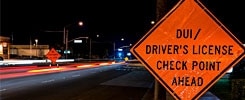
Guest Article by: Attorney David Michael Cantor with The Law Offices of David Michael Cantor.
In Arizona, 16 DUI task forces are routinely deployed across the state. Many of the deployments coincide with holidays, and the Thanksgiving to New Year season is around the corner. So is the Peoria DUI saturation patrol. Over the Labor Day weekend alone, local law enforcement task forces made more than 300 DUI arrests, many of which were charged as extreme DUI with blood alcohol contents in excess of .15. Far more arrests are expected over the holiday season. Peoria DUI police participate in one of the strictest DUI task forces in the country. Given the effectiveness and efficiency of Arizona Task Forces, the National Highway Transportation Safety Administration’s handbook relies heavily on the saturation patrols that the Peoria DUI Task Force participates in. On the flip side of the spectrum, an aggressive Peoria DUI Lawyer with a strong DUI defense strategy is always a good resource to have for those that find themselves face to face with an officer inquiring if that person has had any alcohol to drink.
Saturation Patrols
Saturation patrols are legal in all 50 states. They rely heavily on the deployment of highly visible police officers to specific areas during specific hours to arrest drunk or impaired drivers. Other drivers on the road realize that with the number of police enforcement out there, it’s highly likely that they are going to get arrested if they drink and drive. Erratic driving or the most minor traffic infraction will be subject as probable cause for a traffic stop. Saturation patrols can even be more effective than DUI checkpoints as they can stop repeat drunken or impaired drivers who often circumvent the checkpoints. A neighboring city of Peoria recently took possession of three new unmarked SUVs. They could be used to arrest drunk drivers who attempt to evade checkpoints.
Task Force Coordination
Two decades of experience in the Peoria DUI task force have refined the process involved in saturation patrols. A command post is established that all participating law enforcement agencies can use. They usually consist of large vans or converted motor homes that are conspicuously parked in a central location. They serve as operation and processing units. If a driver refuses to submit to blood alcohol or drug testing, a judge is on call to issue a search warrant and fax it back to the command post. Some police officers are even licensed phlebotomists who can draw blood then and there at the command post. This eliminates the necessity and inconvenience of having to transport a detainee to a hospital to have blood drawn, and it puts the officer who made the traffic stop back in the saturation patrol far more quickly.
DUI Checkpoints
The Peoria task force also participates in DUI checkpoints. These are temporary sites that law enforcement sets up to check drivers for any indicia of intoxication or impairment. Across Arizona, DUI checkpoints are set up at least once a month. They’re usually established at intersections near large parking lots. Officers randomly stop vehicles for a quick license and paperwork check. This gives them an opportunity to view the driver’s eyes, smell their breath and quickly scan the interior of the vehicle for anything illegal that might be in plain view. Should the officer have a reasonable belief that the driver might be intoxicated or impaired, a DUI investigation begins. The U.S. Supreme Court has ruled that DUI checkpoints are legal so long as the stops are random and the date, location, and time of the roadblock is publicized ahead of time.
The DUI Investigation
If an officer has a reasonable belief that you’re under the influence of alcohol and/or impaired by a drug, the usual protocol is to ask you to perform what are known as standard field sobriety tests. Since the law in Arizona doesn’t require you to take field sobriety tests, politely refuse to take them. They’re subjectively evaluated and focused for failure. Most people that don’t drink or use drugs can’t even pass field sobriety tests. You might think that the officer is ordering or commanding you to take the tests, but they’re merely requesting that you do so with an authoritative voice. If you do choose to perform the tests, they may be audio and video recorded, so you’re only giving the prosecutor’s office more evidence to convict you with.
Blood Alcohol or Drug Testing
Whether you take field sobriety tests or not, the officer that stopped you probably made the decision to test your blood for alcohol or drugs within seconds of the time you rolled your window down. The officer is authorized by law to take your driver’s license on the spot. While your best bet is to request to speak with a lawyer (or view our Peoria DUI Lawyer Videos) before either submitting or denying to take the test, if you refuse testing, a search warrant can be obtained and blood can be forcibly taken from you for analysis. Refusal also results in a 12 month driver’s license suspension. If you consent to testing, and your blood alcohol content is .08 or above, or you’re impaired by drugs to the slightest degree, your license will be suspended for 90 days.
Conclusion
DUI law is highly complex. Your best chances of a positive outcome would be to retain a lawyer who focuses their practice on DUI defense, and see them long before your license suspension begins. Be aware of saturation patrols and DUI task forces over the holidays. The Peoria task force will be participating.







